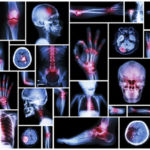It is challenging to find the source of our gut problems, so many of us have related to hypermobility. The volunteer media team at Chronic Pain Partners tried to tackle the basics so our readers could have a brief introduction to the variances and testing available for different diagnoses of these often ‘gut-wrenching’ illnesses.
Note: We understand the disorders are complex and urge you to learn more from a trained medical professional if you’re concerned, as we are merely fellow patients with no training beyond experience. Allergic and/or mast cell reactions can be dangerous and even life-threatening.
Gluten Intolerance & Celiac Disease
Gluten intolerance is a common concern these days for sensitivity or choice, and thank goodness it is getting easier to shop and dine out gluten-free now. Though often overlooked by a large majority of the population, gluten intolerance can cause uncomfortable side effects that can reduce your quality of life – and your choices of where you can eat safely.
All forms of gluten intolerance are characterized by negative reactions to a protein (gluten) found in barley, wheat, and rye. Sometimes, these intolerances are caused by celiac disease or a wheat allergy. Other times, people have what is called “non-celiac gluten sensitivity,” which refers to a basic intolerance to gluten. Interestingly, though many people are aware of the issue of gluten sensitivities and intolerances, there are still many who can’t identify the signs or symptoms.
Symptoms of Celiac Disease
The first symptoms to be aware of are those of celiac disease, the most severe form of gluten intolerance. This is an autoimmune condition that affects around 1% of the population overall.
If you have this condition, you may experience significant symptoms, and can even suffer from damage to the digestive system, including the intestines, that can be long-term if you continue eating gluten, so please see your doctor.
Celiac disease causes various symptoms, from problems with your skin to fatigue. Some of the most common symptoms to watch for are:
- Diarrhea and constipation: Inflammation in the small intestine is common, as are smelly bowel movements and severe discomfort.
- Fatigue: Feeling tired is common among those with celiac disease – several factors, like chronic pain and sleep disruptions, contribute to this.
- Skin conditions: Blistering psoriasis, alopecia, and chronic urticaria are all common.
- Anxiety and depression: People with digestive issues are more prone to issues with depression and anxiety.
- Iron-deficiency anemia: This condition can cause its own symptoms, like fatigue or shortness of breath, as well as pale skin.
- Sudden weight changes: Lack of ability to digest food correctly often leads to weight loss and sometimes weight gain.
- Joint and muscle pain: People with celiac disease can sometimes suffer from pain in their joints and muscles caused by sensory neurons.
- Leg or arm numbness: This is common in individuals with vitamin B12 deficiencies because of their condition.
Symptoms of Non-Celiac Gluten Sensitivity
If you have gluten sensitivity without celiac disease, you may experience less traumatic symptoms. However, these conditions can still be extremely uncomfortable and influence your quality of life. No matter which symptoms you could experience, it’s best to get guidance from a doctor (a gastroenterologist) if you encounter any of the following problems when eating gluten:
-
- Bloating: Bloating is very common with gluten intolerance because it is difficult for the body to process the protein correctly.
- Diarrhea and constipation: These issues are often triggered by the consumption of food that contains gluten, even trace amounts that can last for several days.
- Stomach pain: Abdominal pain or cramping is a very common condition with numerous explanations, but it’s frequently connected to gluten issues.
- Headaches: Many people with gluten intolerance experience headaches and migraine attacks. Studies show gluten intolerance can make these issues more common.
- Fatigue: Feeling tired is common and can be linked to multiple conditions like ME/CFS, Lyme disease, dysautonomia, and more. However, if you feel very tired regularly, you should explore the possibility of the true underlying causes with your provider.
- Depression and anxiety: Depression and anxiety are common side effects of severe pain and discomfort for people with gluten intolerance.
- Brain fog: Some people with gluten intolerances struggle to focus on specific topics or tasks after consuming gluten. This is referred to as “brain fog.”
What If It’s a Wheat Allergy?
Sensitivity is not the same thing as an allergy. An allergic reaction is an immune system response to a certain trigger, such as food or environmental factors. A wheat allergy can be potentially life-threatening, so it’s essential to avoid wheat at all costs if you have this condition.
Symptoms of a wheat allergy might include:
- Skin rashes: Rashes and itching are natural responses to all kinds of allergies, including wheat allergies. Redness and hives may also be common.
- Digestive issues: People with allergies to wheat often experience digestive issues, including cramping, pain, nausea, vomiting, and diarrhea.
- Nasal congestion: A runny nose, congestion, or sneezing can all be signs of a wheat allergy, particularly if you have a condition called “Baker’s asthma.”
- Anaphylaxis: This is a very severe form of allergic reaction that can be life-threatening. It often causes a range of symptoms, including swelling and difficulty breathing, and usually requires an epi-pen injection to calm the body’s reaction to the histamine.
Whether you’re concerned you might have a gluten intolerance or you’re worried you may be showing signs of a wheat allergy, the best thing you can do is seek guidance from a medical professional. All conditions can be extremely difficult to manage on your own, and some can be more dangerous than others. None of them are easy to diagnose, but testing and elimination diets can help rule things out.
Mastocytosis versus Mast Cell Activation Syndrome (MCAS)
Mastocytosis and Mast Cell Activation Syndrome (MCAS) are two distinct conditions involving mast cells, a type of immune cell involved in allergic and inflammatory reactions. While both conditions share similarities in terms of symptoms and mast cell involvement, they differ in their underlying causes and diagnostic criteria. Let’s explore the differences between mastocytosis and MCAS:
Mastocytosis: Mastocytosis is a rare condition characterized by the abnormal accumulation of mast cells in various tissues, such as the skin, bone marrow, gastrointestinal tract, and liver. There are two main types of mastocytosis:
a) Cutaneous Mastocytosis: This form primarily affects the skin and is more common in children. It often presents as raised, reddish-brown skin lesions, which can be itchy and may worsen with friction or temperature changes.
b) Systemic Mastocytosis: This form involves the excessive accumulation of mast cells in various organs throughout the body. Systemic mastocytosis can have different subtypes, ranging from indolent (mild) to aggressive forms. Symptoms can vary widely and may include skin lesions, abdominal pain, diarrhea, flushing, fatigue, and allergic reactions.
Diagnosis of mastocytosis typically involves physical examination, blood and urine tests to measure specific chemicals released by mast cells (e.g., tryptase), and a bone marrow biopsy to confirm the presence of increased mast cells. Keep in mind there are very specific parameters to handling the specimens for testing, and you should discuss if proper protocols are in place to correctly handle the nuance.
Mast Cell Activation Syndrome (MCAS): MCAS, on the other hand, is a condition where mast cells are hyperactive and release excessive amounts of chemical mediators, even in the absence of an obvious trigger. Unlike mastocytosis, MCAS does not involve an abnormal increase in the number of mast cells.
MCAS can have various triggers, such as stress, certain foods, medications, temperature changes, and infections. The symptoms of MCAS are similar to those of mastocytosis and can include flushing, itching, hives, abdominal pain, diarrhea, brain fog, fatigue, and allergic reactions affecting multiple organ systems.
Diagnosing MCAS can be challenging as it requires a comprehensive evaluation of symptoms, along with evidence of mast cell mediator release. Tests may include blood and urine samples to measure mast cell mediators during symptomatic periods or provocation tests where specific triggers are administered to observe the response.
Who Can I See for Mast Cell Related Medical Advice?
When seeking medical care for mast cell disorders, it is recommended to consult with healthcare professionals who specialize in this area who are rare. The following types of specialists are typically involved in the diagnosis and management of mast cell disorders:
- Allergist/Immunologist: Allergists and immunologists are physicians who specialize in the diagnosis and treatment of allergies, immune system disorders, and related conditions. They often have expertise in evaluating and managing mast cell disorders, including mastocytosis and mast cell activation syndrome (MCAS).
- Hematologist/Oncologist: Hematologists are medical doctors who specialize in disorders of the blood, including mastocytosis. Since mastocytosis is considered a type of blood disorder, hematologists can provide valuable insights into the condition, conduct specialized tests, and guide treatment options.
- Dermatologist: Dermatologists specialize in the diagnosis and treatment of skin conditions. In cases of cutaneous mastocytosis, which primarily affects the skin, a dermatologist can evaluate and manage the skin manifestations associated with the disorder.
- Gastroenterologist: Gastroenterologists focus on the diagnosis and treatment of digestive system disorders. As mast cells are present in the gastrointestinal tract and symptoms like abdominal pain and diarrhea are common in mastocytosis, and MCAS, a gastroenterologist may be involved in the care of patients with these conditions.
- Rheumatologist: Rheumatologists specialize in conditions affecting the joints, muscles, and connective tissues. Some patients with mast cell disorders may experience symptoms related to joint pain, musculoskeletal issues, or autoimmune-like symptoms. In such cases, a rheumatologist can provide expert evaluation and management.
Please pardon our over-simplification of complex mast cell disorders, as we are not medical experts but volunteers.
Other Resources
For more information, check out www.TMSforacure.org, the website produced by The Mastocytosis Society. There are also several books on mast cell disorders you can research online as it relates to EDS, including The Trifecta Passport: Tools for Mast Cell Activation Syndrome, Postural Orthostatic Tachycardia Syndrome, and Ehlers-Danlos Syndrome by Amber Walker which many patients find useful.
Need to Know to Get Tested
In today’s more health-conscious world, there is an increasing awareness of various conditions related to food sensitivities and intolerances. Three such conditions, gluten intolerance, celiac disease, and mastocytosis or mast cell activation syndrome, have gained considerable attention in recent years. If you suspect you may be experiencing symptoms associated with these conditions, it is essential to undergo the proper tests for an accurate diagnosis. In this article, we will explore the testing methods used to determine gluten intolerance, celiac disease, and mastocytosis/MCAS in a simple way, as this is a complex condition that requires expert medical professionals to properly guide patients.
Gluten Intolerance: Gluten intolerance, non-celiac gluten sensitivity, refers to a condition where individuals experience symptoms similar to those of celiac disease without the associated intestinal damage. Although there are no definitive tests for gluten intolerance, the diagnosis is typically reached by a process of elimination.
a) Symptom observation: Pay close attention to any adverse reactions, such as digestive issues, bloating, fatigue, or headaches, that occur after consuming gluten-containing foods.
b) Gluten elimination diet: Under the guidance of a healthcare professional, remove all sources of gluten from your diet for a period of time (usually several weeks) and monitor any changes in symptoms. If symptoms improve during the elimination phase and reappear upon reintroducing gluten, it may indicate gluten intolerance.
Celiac Disease: Celiac disease is an autoimmune disorder triggered by the ingestion of gluten. It is crucial to accurately diagnose celiac disease as it can lead to severe health complications if left untreated.
a) Serologic tests: Blood tests are commonly used to detect specific antibodies associated with celiac disease. The most common tests are tissue transglutaminase (tTG) antibody, anti-endomysial antibody (EMA) test, and anti-deamidated gliadin peptide (DGP) antibody test.
b) Intestinal biopsy: If blood tests indicate a possibility of celiac disease, endoscopy with a small intestine biopsy may be recommended to confirm the diagnosis. During the procedure, a small tissue sample is taken from the small intestine for examination under a microscope to assess any damage to the intestinal villi.
Mastocytosis: Mastocytosis is a disorder characterized by an abnormal accumulation of mast cells in various tissues. Mast cells are a normal part of a functioning immune system in the human body but can be hyper-reactive in people with mastocytosis and makes them seem “allergic” to many, many things with strong and scary reactions possible, including anaphylaxes. When mast cells detect a substance that triggers an allergic reaction (an allergen), they release histamine and other chemicals into the bloodstream. Histamine makes the blood vessels expand and the surrounding skin itchy and swollen. It can also create a build-up of mucus in the airways, which become narrower and restrict breathing. When triggered, these mast cells release substances that can cause signs and symptoms similar to those of an allergic reaction and, sometimes, severe inflammation that may result in organ damage, according to the Mayo Clinic. Common triggers include alcohol, spicy foods, insect stings, and certain medications.
Any mast cell condition can present with a wide range of symptoms, making diagnosis challenging, but here are the basics.
a) Physical examination by a trained doctor: A thorough physical examination is crucial to identify any physical manifestations associated with mastocytosis, such as skin lesions or enlargement of the liver or spleen.
b) Blood and urine tests: Blood and urine tests may be conducted to measure the levels of certain chemicals released by mast cells, such as tryptase and histamine. Elevated levels of these substances can indicate mastocytosis. Testing protocols and rituals are very important here, so ensure the lab knows what they are doing.
c) Bone marrow biopsy: In some cases, a bone marrow biopsy may be recommended to examine the number and appearance of mast cells in the bone marrow, helping to confirm the diagnosis.
Conclusion – Seek Guidance from a Medical Professional
If you suspect you may be experiencing gluten intolerance, celiac disease, or mastocytosis, seeking a proper diagnosis is essential for managing your health effectively. Remember to consult with a healthcare professional who can guide you through the testing process and help you interpret results. Whether it involves elimination diets, blood tests, or more invasive procedures like biopsies, accurate diagnosis is the first step towards developing a suitable treatment plan and achieving a better quality of life, and reducing the instances of reactivity.
Pardon our over-simplification of complex mast cell disorders, as we are not medical experts. For more information, check out www.TMSforacure.org, the website produced by The Mastocytosis Society, where more resources are available.
Cover Image: Pixabay
Chronic Pain Partners Media Team
September 2023


